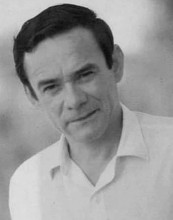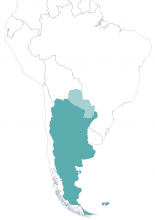Agustín Goiburú Giménez was a Paraguayan doctor who was married with three children. He was 47 years old when he was captured on 9th February 1977 in the city of Paraná (northeast Argentina) having suffered decades of persecution by the Paraguayan dictatorship.
As a young medic, Goiburú had worked at the Rigoberto Caballero Police Hospital in Asunción. In 1958, he was one of the founders of the Movimiento Popular Colorado (Colorado Popular Movement, MOPOCO): an opposition party to the dictatorship of General Alfredo Stroessner, which strangled Paraguay from 1954.
Goiburú denounced the torture and inhumane treatment faced by the regime's opponents. He was finally forced to give up his job in the hospital for refusing to sign false death certificates that concealed the death by torture of political prisoners. The Paraguayan dictatorship relentlessly harassed the doctor, who sought refuge in the Uruguayan Embassy before fleeing the country. In 1959, he settled with his family in Posadas, the capital of Misiones Province (Argentina), on the border with Paraguay.
Despite having abandoned his country, the doctor incessantly denounced the crimes committed by Stroessner across the border. Agustín saw firsthand the bodies of young people- who had been brutally tortured and thrown from aeroplanes by the Paraguayan Army- floating down the Paraná river. Meanwhile, the Paraguayan dictator conspired plans to detain Goiburú. In November 1969, the regime got its claws on him for the first time: the Paraguayan Navy captured the doctor while he was fishing in the Paraná river in Argentine waters with his son, Rolando, and two friends. Goiburú was immediately transferred to Asunción, where his wife traced him down three months later. Due to rising international pressure, he was finally moved to the Policía de la Capital (Capital Police) station. He managed to escape with other prisoners in December 1970 by digging an underground tunnel. After seeking political asylum in the Chilean Embassy, Goiburú later rejoined his family in Argentina. His escape publicly undermined Stroessner and Goiburú thus became the number one enemy of the dictatorship.
Goiburú's persecution escalated after the doctor was accused of being the mastermind behind an assassination attempt against the dictator. In December 1974, two armed men entered Goiburú's family home: Rogelio (the eldest son), his brother, and some neighbours managed to capture one intruder, the police officer Bernardo Cocco. The officer later confessed that the failed attempt to capture Goiburú had been planned by the Head of the Investigations Department of the Capital Police, Pastor Coronel.
Goiburú no longer felt safe in Posadas. He wrote down all the cars and people who followed him in his diary. In February 1975, he travelled to the Argentine city of Paraná, 780 kilometres away from the Paraguayan capital of Asunción. However, distance was no obstacle for Stroessner. In 1975, another attempted kidnapping fell through at the last minute.
Following the Argentine coup d'état in March 1976, Goiburú's situation became increasingly precarious. Argentine and Paraguayan agents, as well as diplomats, were constantly spying on the doctor and his family. The Paraguayan consul, Francisco Ortiz Téllez, kept a close eye on the community of Paraguayan opponents exiled in northern Argentine and provided regular updates on their meetings and whereabouts.
At the beginning of 1977, the security forces conspired a highly sophisticated kidnapping plan under the codename 'Safari'. They knew that Goiburú had adopted security measures and kept arms in his house and medical practice. The day prior to the operation, Goiburú was summoned to the local police station, where the officers left him waiting for a long time, before telling him that there had been a mistake. While he was there, he noticed that various passersby were staring at him.
The following day, approaching noon on 9th February 1977, the operation was unleashed. A green Ford Falcon crashed into Goiburú's parked car. When the doctor emerged from the house to assess the damage, a group of armed men immediately captured him and forced him to enter a car that headed towards an unknown destination.
His family immediately began a desperate search, which confirmed that Goiburú had been handed over to the Paraguayan authorities shortly after his capture. A former political prisoner, Domingo Rolón, saw Dr. Goiburú inside the Police Investigations Department of Asunción in March 1977. The doctor had asked his fellow detainee who he was before and then introduced himself, explaining that he had been transferred from Argentina. An Argentine colonel confirmed that the doctor had been secretly moved across the border.
Dr. Goiburú remains disappeared today. The deprivation of his liberty was included in the Argentine Condor trial between 2013 and 2016. The crime was attributed to the former Argentine dictator, Jorge Rafael Videla. The defendant died during the trial, meaning that the court could not issue a judgement for the case.


